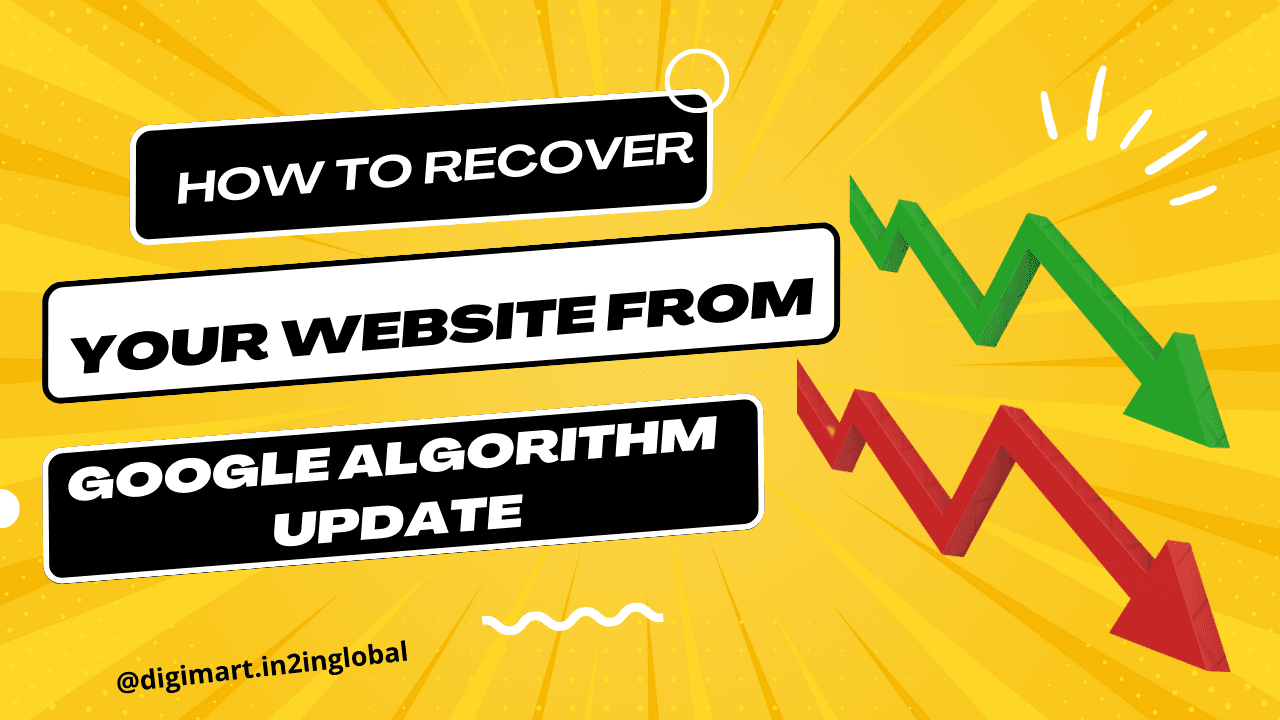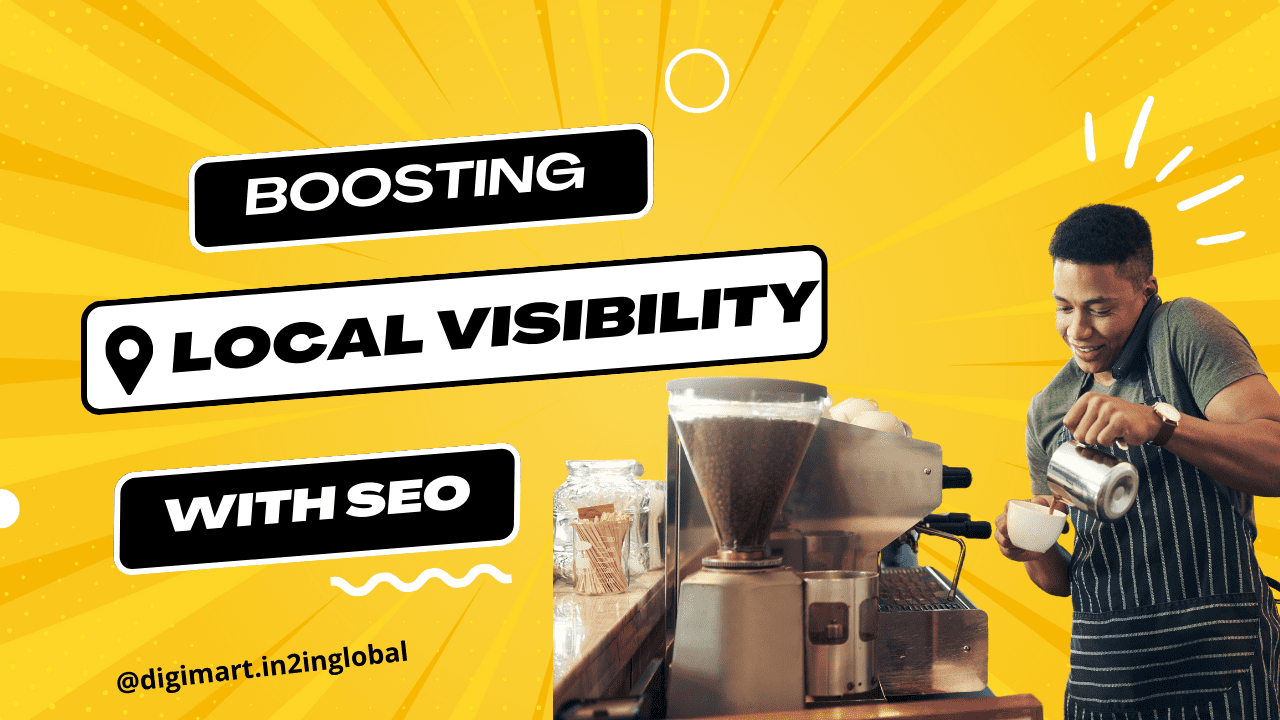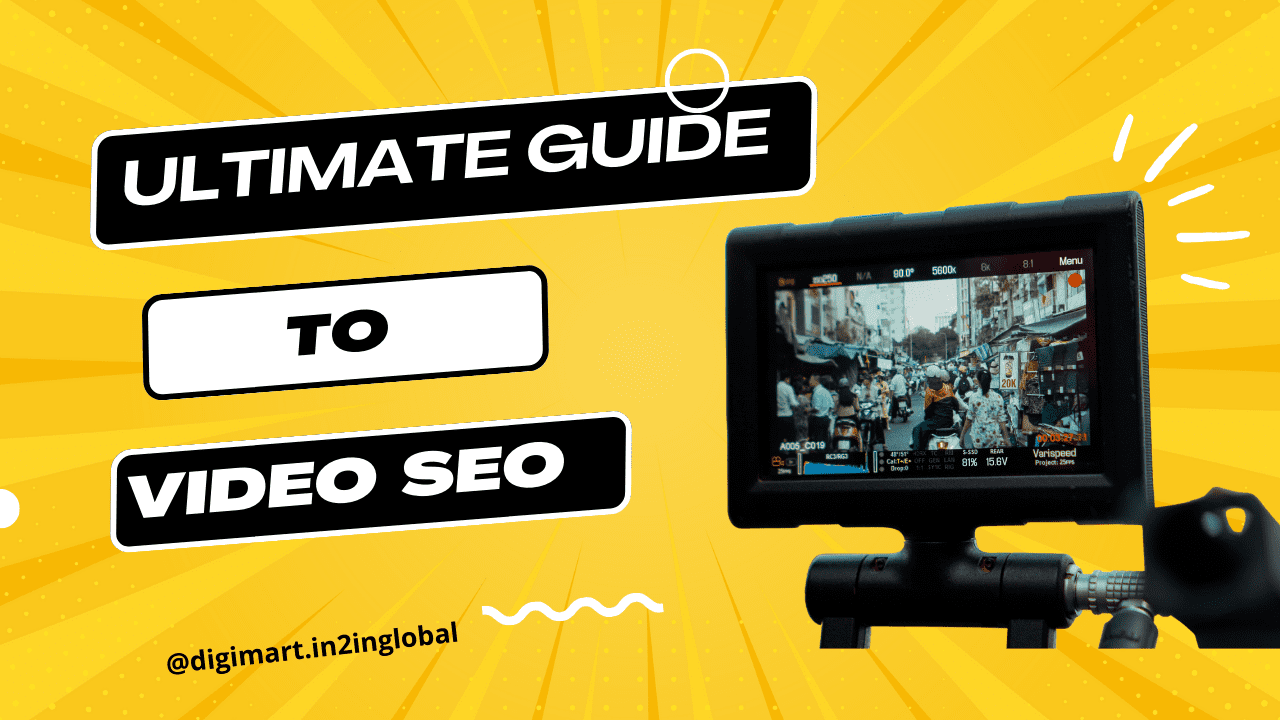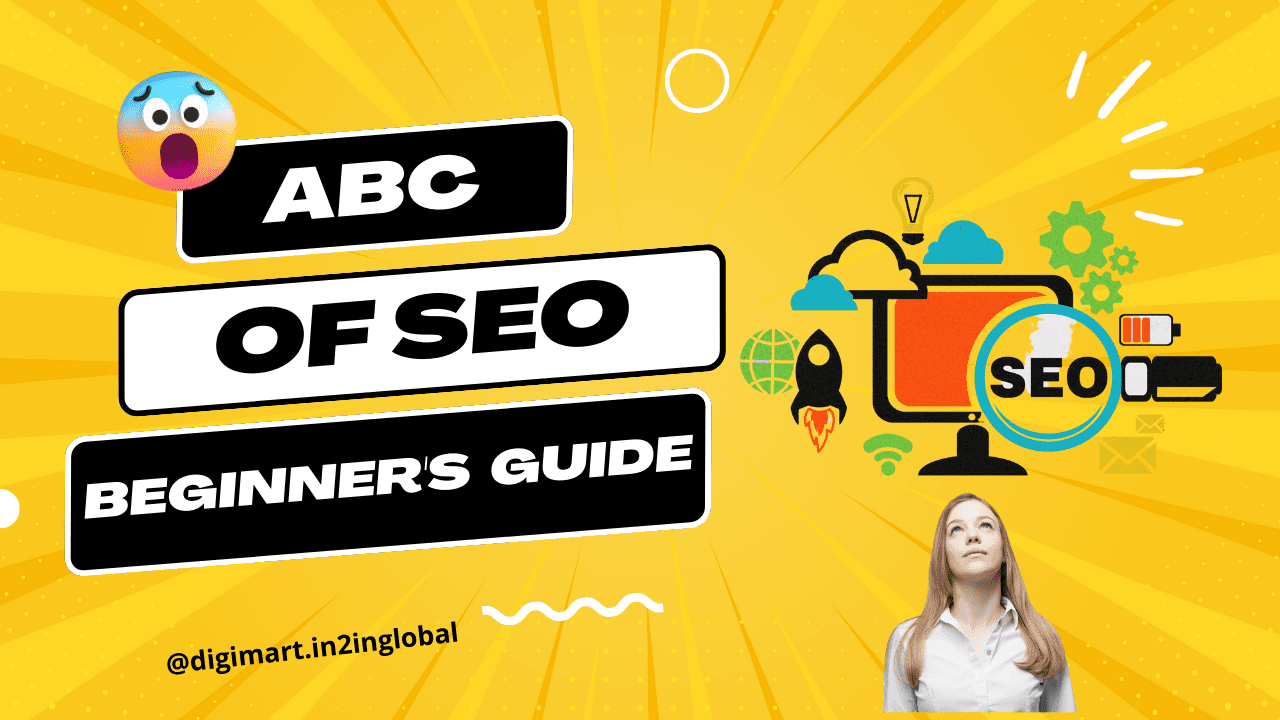
13, Oct 2023
How to Recover from a Google Algorithm Update
Are you feeling lost in the ever-changing digital landscape after a sudden Google algorithm update? Don’t fret! We’ve got your back, guiding you through the stormy waters of SEO.
In this blog post, we’ll unravel the secrets to recovering from a Google algorithm update and help you steer your website towards success once again. So, grab your compass and get ready to navigate this wild ride together!

What is a Google Algorithm Update?
When it comes to Google algorithm updates, there is a lot of misinformation out there. A Google algorithm update is a change to the way Google calculates rankings. These updates can be small, like a change to the way synonyms are handled, or they can be major, like a change to the way page titles are evaluated.
They can also be negative, meaning they can result in a drop in rankings for sites that were previously doing well. And finally, they can be rolled back, which means that the changes are reversed and things go back to the way they were before the update.
Google makes hundreds of small changes to its algorithms every year, but every now and then, there’s a major update that has a significant impact on search results. When this happens, it can be difficult to determine what has changed and how to adjust your SEO strategy accordingly.
However, by keeping an eye on your traffic and rankings and being aware of any major changes that occur within the search landscape, you can usually identify when an algorithm update has taken place and take steps to recover if necessary.
How to Prepare for an Google Algorithm Update?
When it comes to algorithm updates, the best defense is a good offense. By being proactive and staying up-to-date on the latest SEO news and trends, you can minimize the impact of an algorithm update on your website. Here are some tips on how to prepare for an algorithm update:
- Monitor your website’s traffic and rankings. This will help you identify any potential red flags that could indicate an algorithm update is coming.
- Stay up-to-date on SEO news and trends. This way, you’ll be better prepared to make any necessary changes to your website before an update hits.
- Be proactive about making changes to your website. If you know an update is coming, take steps to ensure your website is optimized for the new algorithm. This may involve changing your keyword strategy or improving your site’s content and structure.
- Communicate with your team. If you have a team of people working on your website, make sure everyone is on the same page about the upcoming changes. This will help ensure a coordinated effort when it comes time to implement the changes.
- Have a plan in place for when things go wrong. Despite our best efforts, sometimes algorithm updates can still catch us off guard. Having a plan in place for what to do if your traffic or rankings take a hit can help mitigate the damage and get you back on track quickly.
By following these tips, you can be better prepared for the next algorithm update and minimize its impact on your website. Good luck!
Tactics to Recover After a Google Algorithm Update
It’s no secret that Google algorithm updates can cause major disruptions in the SEO world. While some updates are small and go unnoticed, others can cause your website to lose rankings and organic traffic overnight.
If you’ve been hit by an algorithm update, don’t panic! There are things you can do to recover. Here are a few tactics to get you started:
- Evaluate your website content. After an algorithm update, take a close look at your website content. Are there any areas that need to be updated or improved? If so, make the necessary changes and re-publish your content.
- Check your backlinks. Another reason why your website may have lost ranking is due to a loss of backlinks. Use a tool like Ahrefs or Majestic to check your backlink profile and see if there have been any major changes. If you’ve lost a lot of backlinks, reach out to the webmasters of those sites and see if you can get them restored.
- Adjust your keywords. It’s also possible that the keywords you’re targeting have changed after an algorithm update. Use a tool like Google AdWords Keyword Planner or SEMrush to research new keywords and make sure you’re targeting the right ones in your content.
- Monitor your analytics data closely. After an algorithm update, keep a close eye on your analytics data so you can identify any changes and adjust your tactics accordingly.
By following these tactics, you should be able to quickly recover from an algorithm update and get back on track with your SEO efforts.
Tips for Long term SEO Strategy
SEO is an ever-changing landscape and Google is constantly updating its algorithms. This can be frustrating for businesses who rely on organic traffic from Google searches. However, there are some things you can do to weather the storm and recover from a Google algorithm update.
Here are some tips for long term SEO strategy:
- Identify which algorithm update has impacted your traffic. There are many resources online that can help you do this (Google Search Console is a good place to start). Once you know which update has caused your traffic to drop, you can take steps to adjust your SEO strategy accordingly.
- Do not make drastic changes to your website in response to an algorithm update. Google can penalize you for making sudden changes to your website that are not in line with their guidelines. Instead, make small tweaks and test them over time to see what works best for your site.
- Keep producing high-quality content that is relevant to your audience. This is one of the most important things you can do for long term SEO success. Algorithm updates may cause your traffic to fluctuate in the short-term, but if you have strong content on your site, people will keep coming back.
- Promote your content through social media and other channels. This will help ensure that even if your organic traffic from Google dips, you still have other sources of traffic coming to your site.
- Monitor your SEO performance regularly and make adjustments as needed. Algorithm updates can cause sudden changes in your rankings and traffic, so it’s important to stay on top of them and make the necessary changes to get back on track.
Conclusion
Navigating the storm of a Google algorithm update can seem daunting but by understanding the importance of keeping content fresh and relevant, you can find your way through. By taking stock of your current website performance and making adjustments to meet changing user expectations, you will create an SEO strategy that is resilient even in the face of unexpected updates. And while there may be some bumps along the way, if you keep these key points in mind when recovering from an algorithm change, then recovery should be achievable with minimal damage to your business success.
- 0
- By info

12, Oct 2023
“Boost Your Business with Expert Local SEO Strategies”
Are you tired of your community events going unnoticed, while others thrive with a bustling crowd? It’s time to take matters into your own hands and unlock the power of local SEO! In this comprehensive guide, we will equip you with all the tools and strategies needed to boost local visibility for your events. From optimizing content to leveraging social media, get ready to transform your community gatherings into unforgettable experiences that attract attendees from near and far. Don’t let your events go unnoticed any longer – join us on this local SEO adventure and watch as your local visibility skyrockets!
What is Local SEO and why is it important for local events?

SEO, or search engine optimization, is the process of improving the visibility and ranking of a website or web page in search engine results pages (SERPs). It is a key part of any online marketing strategy, and can be used to drive traffic to your event website from both organic (unpaid) and paid sources.
There are many factors that go into SEO, but one of the most important for local events is location. Search engines use a variety of signals to determine where your event should appear in search results, and one of those signals is the physical location of your event. This means that if you want your event to show up in searches for people in your area, you need to optimize your website for local SEO.
Fortunately, there are a number of things you can do to improve your local SEO. Here are a few tips:
- Make sure your event listing appears on popular local directories and listings sites. This will help search engines find and index your event website.
- Use relevant keywords on your website and in your event listings. This will help search engines understand what your event is about and match it with relevant searches.
- Use geo-targeted keywords. For example, if you’re holding an event in Los Angeles, include the keyword “Los Angeles” in your title tags, meta descriptions, etc. This will help ensure that your event appears in searches for that location.
- Optimize your website for mobile. Most people these days use their phones to search for local events, so making sure your website is optimized for mobile is essential.
By optimizing your website and event listings for local SEO, you can improve the visibility of your event and ensure that it reaches the right audience.
How to Optimize Your Local Event Website for Local SEO?
Assuming you have a website for your local event, there are a few key things you can do to optimize it for search engine visibility.
First, make sure all of your website content is keyword-rich and relevant to what people would be searching for when looking for an event like yours. Include detailed descriptions of the event, its location, date and time, as well as any other relevant information.
Next, focus on building backlinks to your website from other high-quality websites. This will help improve your website’s authority and search engine ranking. You can do this by submitting your website to directories, creating informative blog posts or articles about your event, and reaching out to other websites in your industry or niche to see if they’ll link to your event website.
Generate social media buzz around your event by sharing links to your website on all of your social media channels and encouraging others to do the same. The more people that are talking about your event online, the more likely it is that searchers will find your event website in the search results.
Tips on Maximizing Your Local Search Visibility
There are a few key things you can do to make sure your local event is visible in search engine results pages (SERPs). Here are some tips:
1. Use keyword-rich titles and descriptions.
Make sure your event title and description include relevant keywords for your target audience. This will help search engines match your event with relevant queries.
2. Optimize your website for local SEO.
Ensure that your website is optimized for local SEO by including your city and state in titles, tags, and other metadata. You can also submit your site to online directories like Yelp and Google Places.
3. Promote your event on social media.
Social media can be a great way to promote your event and reach new audiences. Be sure to create event listings on sites like Facebook and Eventbrite, and share them regularly on Twitter, LinkedIn, and other social networks.
Best Practices for Local SEO Content Writing
When it comes to SEO content writing, there are a few best practices that you should always keep in mind. First and foremost, your content should be well-written and free of any grammar or spelling errors. It should also be relevant to your target audience and offer value in terms of information or entertainment.
In terms of keyword usage, you should always strive for quality over quantity. Stuffing your content full of keywords will not only make it difficult to read, but it will also likely get flagged by search engines as spam. Instead, focus on using a few key phrases throughout your content in a way that flows naturally.
Make sure to promote your content across the web. Social media is a great way to get the word out about your latest blog post or article. And don’t forget to include links back to your website in your profiles and posts!
Utilizing Online Resources to Increase Visibility
Organizing a community event can be a daunting task, but with the right planning and execution, it can be a successful and rewarding experience. One of the most important aspects of any event is making sure that it is visible to those who might be interested in attending. In the age of the internet, this means utilizing online resources to increase visibility.
There are a number of ways to do this, but some of the most effective include:
- Creating a website or landing page for your event This is a great way to centralize all of the information about your event in one place. Make sure to include key details like the date, time, location, and what attendees can expect.
- Utilizing social media platforms to promote your event Platforms like Facebook and Twitter are great for getting the word out about your event. Create an event page on Facebook and share it with your friends and followers. Use hashtags on Twitter to help people find your tweets about the event.
- Submitting your event to online calendars and directories There are many websites that list local events happening in specific areas. By submitting your event to these sites, you’ll make it easier for people interested in attending similar events to find yours.
By utilizing these online resources, you’ll give your community event the best chance at success!
Making Use of Social Media
As the world becomes increasingly digitized, it’s more important than ever for community events to have a strong online presence. One of the best ways to boost local visibility and get people interested in your event is through social media.
There are a number of different ways you can make use of social media to promote your community event. Firstly, create a Facebook page or Twitter account dedicated to the event. Be sure to post regular updates and share relevant content that will interest your target audience. Secondly, reach out to local influencers and ask them to help promote the event. This could involve asking them to write a blog post about the event, share it on their social media channels, or even attend the event itself.
Make use of hashtags when promoting the event on social media. This will help people easily find your content and also allow you to track how effective your marketing campaign is. By following these simple tips, you can ensure that your community event gets the attention it deserves!
Conclusion:
Community events are a great way to bring people together and create lasting experiences. However, it can be hard to get the word out about your local event without using search engine optimization (SEO). This comprehensive guide has given you all of the information you need to get started on boosting your local visibility through Local SEO for community events. With these tips and strategies, you should now have everything you need to make sure that your event gets the attention it deserves!

9, Oct 2023
How to Create Videos for Search Engines to Boost Visibility

Are you ready to take your video content to new heights and ensure its visibility across the vast digital landscape? Look no further, as we unveil the ultimate guide to Videos for Search Engines! In this comprehensive handbook, we will equip you with all the essential tools and techniques needed to optimize your videos for search engines.
From unraveling the mysteries of metadata and keyword research to unlocking the secrets of thumbnail optimization, get ready to skyrocket your video rankings and capture the attention of audiences far and wide.
So grab a pen, buckle up, and let’s embark on an adventure that will transform your videos into undisputed champions in search engine results pages!
Introduction to Videos for Search Engine and Its Benefits
If you’re not using video as part of your SEO strategy, you’re missing out. Video is a powerful tool that can help you rank higher in search engine results pages (SERPs), drive traffic to your website, and boost engagement.
What is video SEO? Video SEO is the process of optimizing your videos for search engines. Just like with traditional SEO, this process includes optimizing your video title, description, tags, and thumbnail for relevant keywords.
Why should you bother with video SEO? Because it can help you achieve all of the following:
- Improved SERP rankings: A well-optimized video can help your website rank higher in SERPs, driving more traffic to your site.
- More website visitors: More traffic means more potential customers or clients visiting your site.
- Increased engagement: Videos are more engaging than text alone, so adding videos to your website can keep visitors on your site longer. This can lead to improved conversions and sales.
Ready to get started with Videos for Search Engines? Here’s what you need to know.
- Research relevant keywords: Before you start optimizing your videos, you need to know which keywords are most relevant to your target audience. Use Google Keyword Planner or other keyword research tools to identify the best keywords for your video content.
- Create optimized video titles and descriptions: Once you’ve identified relevant keywords, use them in your video titles and descriptions. Make sure that your titles and descriptions accurately describe the content of the video, while also including the targeted keywords.
- Utilize tags: Tags are another important component of video SEO because they tell search engine crawlers what the video is about. Choose tags that are related to the topic of the video and include some of your chosen keywords.
- Optimize thumbnails: Thumbnails are an important part of a successful SEO strategy because they help viewers identify which videos they want to watch. Choose thumbnails that accurately represent the content of each video and include a catchy title or phrase, such as “Learn How To…”
By following these steps, you can make sure that your videos are properly optimized for search engine crawlers and more likely to turn up in SERPs when someone searches for relevant terms.
Key Elements of Effective Videos for Search Engines
There are a few key elements to effective video SEO. First, you need to have great title tags that accurately describe your video content. Secondly, you need to have transcripts of your videos so that search engines can index the spoken word and make your video more searchable. You need to host your videos on a platform that is easily crawl able by search engine bots.
If you want your videos to be found by potential viewers, then you need to optimize them for search engines. This means using the right keywords in your title tags and transcripts, as well as hosting your videos on a platform that is easily indexed by search engine bots. By taking these steps, you can ensure that your videos are more likely to show up in search results, driving traffic to your website or blog.
Tips for Optimizing Your Videos for Search Engines
- Make sure your videos are well-optimized for search engines. This means using the right keywords and tagging your videos properly.
- Use transcripts of your videos to help improve their search engine rankings.
- Promote your videos on social media and other websites to help them reach a larger audience.
- Make sure your videos are mobile-friendly so people can watch them on the go.
- Use descriptive titles and descriptions for your videos to help people find them more easily.
- Try to get links from high-quality websites to point to your videos. This will help improve their search engine ranking even further.
Tools for Improving Your Videos for Search Engines Performance
There are a number of tools you can use to improve your video SEO performance. Here are just a few:
- Google’s Keyword Planner: This tool allows you to research keywords and get ideas for new keywords to target.
- YouTube Analytics: This tool lets you track your video views, watch time, and other engagement metrics. You can use this data to optimize your videos for better performance.
- VidIQ: This is a paid tool that provides insights into how your videos are performing on YouTube and what you can do to improve them.
- Wistia: Wistia is a video hosting platform that also offers some great video SEO features, like transcripts and customizable player colors.
- BuzzSumo: Use this tool to see which videos are performing well on social media so you can replicate that success with your own videos.
Strategies for Getting More Views on YouTube
As the second most popular website in the world, YouTube receives over one billion unique visitors every month. That’s a lot of eyeballs, and if you can get even a small fraction of those viewers to watch your videos, you’ll see a significant increase in your traffic.
There are a number of strategies you can use to get more views on YouTube. Some are simple and only take a few minutes to implement, while others require a bit more effort but can have a big impact.
Here are some strategies for getting more views on YouTube:
Optimize Your Video Title and Description
Just like with regular SEO, your video title and description are important for ranking in YouTube search results. Include relevant keywords in both your title and description, and make sure that your description is compelling enough to entice people to click through to your video.
Create Engaging Thumbnails
Your thumbnail is what appears in the search results next to your video title, so it needs to be eye-catching and relevant to the content of your video. If possible, include text on your thumbnail image as this can help improve your click-through rate.
Use Keywords in Your Tags
YouTube allows you to add up to 500 characters of tags to each video you upload. These tags help YouTube understand what your video is about so they can surface it in relevant searches. Be sure to include a mix of both general and specific keywords so that your video can be found by a wide range of viewers.
Promote Your Videos on Social Media
Take advantage of the large reach of social media platforms like Facebook, Twitter, and Instagram to promote your videos. You can easily share a link to your YouTube video on any of these networks and get more eyeballs on your content.
Create Playlists
When you create playlists in YouTube, you’re creating an easy way for viewers to find more related content from you. This encourages people to stick around longer and potentially watch more of your videos, which will increase the overall views for your channel.
Collaborate with Other Creators
Partnering up with other creators is a great way to get more views on YouTube. Reach out to channels with similar audiences or topics as yours and collaborate by doing joint videos or cross-promoting each other’s content. This will help bring new viewers to both of your channels without having to do all the promotion yourself.
How to Track and Measure Success of Your Videos for Search Engines Campaigns?
There are a number of ways to track and measure the success of your video SEO campaigns. One way is to track the number of views and engagement that your videos receive. You can also track how well your videos rank in search engines for key keywords and phrases. Additionally, you can measure the amount of traffic that your videos drive to your website or blog.
Conclusion
Videos for Search Engines is an incredibly powerful tool for increasing your website’s visibility and reach in search engine results. By optimizing the technical aspects of your videos, taking advantage of YouTube’s advanced features, and leveraging social media channels to increase promotion, you can create a successful video SEO campaign that will help drive more traffic and conversions for your business.
With the right strategy in place, you can make sure that your videos are seen by as many people as possible.

4, Oct 2023
The ABCs of SEO: An Essential Beginner’s Guide
Welcome to the exciting world of SEO! Whether you’re a small business owner, a content creator, or simply someone curious about improving their online presence, this beginner’s guide is your key to unlocking the secrets of Search Engine Optimization.
In today’s digital age, understanding the ABCs of SEO has never been more crucial for standing out in the virtual crowd and driving organic traffic to your website.
So grab your learning caps and get ready to delve into this essential guide that will empower you with all the knowledge you need to conquer search engine rankings and elevate your online success. Let’s embark on this journey together as we demystify the world of SEO one letter at a time!
What is SEO?
Search engine optimization (SEO) is the practice of improving the ranking of a website on search engines. The higher the ranking, the more likely people are to find the website.
There are a number of factors that contribute to a website’s ranking on search engines, including the quality and quantity of the website’s content, the number of incoming links to the website, and the website’s overall popularity.
SEO is an important tool for anyone who wants to increase traffic to their website. By improving their website’s ranking on search engines, they can make it easier for people to find their site and, ultimately, increase their business.
Basics of SEO and how it works:
SEO is short for “Search Engine Optimization”. It is a long-term marketing strategy employed in order to improve a websites visibility and organic search results in google and other global search engines.
SEO works by optimizing a website for google’s ever-changing algorithms. Google uses these algorithms to decide which websites should be displayed on the first page of their search engine results pages (SERPs).
To optimize your website, you need to understand how these algorithms work and make sure your website meets all of the criteria they are looking for. This can be a difficult and time-consuming task, which is why many businesses hire SEO specialists or agencies to do it for them.
Different types of SEO tactics:
There are a number of different types of SEO tactics that you can use to improve your website’s ranking in search engines. Some of the most common and effective SEO tactics include:
Keyword research –
Identifying the right keywords to target is one of the most important aspects of successful SEO. You need to identify keywords that are relevant to your business and that have a high search volume but low competition.
On-page optimization –
Once you’ve identified the right keywords, you need to make sure that your website is optimized for those keywords. This includes optimizing your title tags, meta descriptions, header tags, and content for the target keywords.
Link building –
One of the most important ranking factors for any website is the number and quality of links pointing to it. You can improve your website’s link popularity by actively pursuing link opportunities and building high-quality backlinks from relevant websites.
Social media marketing –
Social media can be a great way to promote your website and its content. Creating social media profiles on popular sites like Facebook, Twitter, and Google+ can help increase your visibility online and attract more visitors to your website.
Pay-per-click advertising –
Paid advertising can be an effective way to get more traffic to your website in the short term. However, it’s important to ensure that your ads are targeted towards relevant keywords so that you don’t waste money on unqualified clicks.
On-Page vs. Off-Page SEO:
There are two types of SEO:
on-page and off-page. On-page SEO is the process of optimizing a website for search engines, with the goal of earning higher web traffic levels and improving the visibility of the site. Off-page SEO, on the other hand, refers to the efforts made outside of a website to improve its search engine rankings. The most common methods used in off-page SEO include link building and social media engagement.
Both on-page and off-page SEO are important for any website that wants to rank well in search engines. However, which one is more important depends on the individual website and its current situation. In general, though, it is recommended that website owners focus on both types of SEO in order to achieve the best results.
Keyword Research & Analysis Strategies:
When it comes to SEO, keyword research and analysis is essential. There are a number of strategies you can use to ensure you are targeting the right keywords for your website and getting the most out of your SEO efforts.
One strategy is to use keyword research tools like Google AdWords Keyword Planner and Moz Keyword Explorer. These tools will help you to identify relevant keywords for your website based on search volume and competition.
Another strategy is to use competitor analysis. This involves looking at what keywords your competitors are targeting and how they are ranking for those keywords. This can give you insights into which keywords you should be targeting.
It is also important to keep an eye on your website’s search engine rankings. This will give you an indication of how well your SEO efforts are paying off and which keywords are driving traffic to your site.
Technical SEO & Website Optimization:
Technical SEO is the process of optimizing a website for Google’s search algorithm. It involves improving the site’s code, structure, and overall speed and performance. Technical SEO is a complex and ever-evolving field, but there are some essential basics that all website owners should know.
To start, make sure your site is well-coded and free of errors. This will help Google index your site correctly and improve its crawling speed. Next, focus on improving your site’s structure and organization. Use clear, descriptive titles and headings to help Google understand your content. Work on speeding up your site. A fast loading website will improve your user experience and rankings in Google’s search results.
By following these basic technical SEO tips, you can improve your website’s visibility and draw more traffic from Google’s search engine. For more detailed information on technical SEO, check out our comprehensive guide below.
Link Building & Content Strategies:
In order to rank higher on search engine results pages (SERPs), your website needs links from other websites. Link building is the process of acquiring these links.
There are many different ways to build links, but some methods are more effective than others. Some common link building strategies include:
• Creating informative or entertaining content that other websites will want to link to
• Creating helpful resources such as infographics or how-to guides that other websites will want to link to
• Participating in forums or online communities and providing helpful responses that include a link back to your website
• Reaching out to bloggers or influencers in your industry and asking them to mention your website in their next blog post or social media update
Local SEO Tactics
If you’re running a local business, you need to make sure your website is optimized for local search. Here are some tactics you can use to make sure your site comes up in relevant local searches:
-Make sure your NAP (name, address, and phone number) is consistent across all your listings and on your website.
-Claim and verify your Google My Business listing.
-Optimize your website for relevant keywords.
-Build citations from high-quality directories.
-Encourage customer reviews and testimonials.
Creating an Effective SEO Strategy:
Any business with an online presence needs to invest in SEO. Search Engine Optimization ensures that your website is visible to people who are searching for the products or services you offer. An effective SEO strategy will help you to rank higher in search engine results pages, and attract more organic traffic to your website.
To create an effective SEO strategy, you need to understand how search engines work and what factors they use to rank websites. Keyword research is essential for understanding which terms people are searching for, and how difficult it will be to rank for those keywords. Once you have targeted a few key phrases, you can start optimizing your website content and structure to make it more search engine friendly.
Building links from other websites is another important part of SEO. Link popularity is one of the main factors that search engines use to rank websites. The more high quality links you have pointing to your website, the higher your site will rank. Guest blogging on other sites, directories, and forums can also help increase your link popularity.
SEO is a complex and ever-changing field, but by following these basic principles you can get started on improving your website’s visibility in search engine results pages.
Conclusion:
SEO is an essential part of any website’s success. It can help to boost traffic, improve conversions, and increase visibility in the search engine rankings. With this ABCs of SEO guide, you now have a better understanding of the basics and are equipped with the knowledge needed to start optimizing your website for success. Remember: SEO takes time and dedication – but if done right it can make a real difference in terms of driving more organic traffic to your site. Good luck!
9, Mar 2023
Digital Marketing Services in India for Your Business Growth

Are you looking for ways to reach more customers and boost your online presence? Digital marketing services are the perfect solution. Digital marketing is the process of using various digital channels, such as search engines, social media, and email, to promote products or services and increase customer engagement. These services can help businesses build a strong presence in the digital world and reach more potential customers than ever before. In this blog post, we’ll explore the different types of digital marketing services in India available and how they can be used to maximize your reach. Read on to learn more about what digital marketing can do for your business.
What is digital marketing?
Digital marketing is any marketing that takes place online. This can include things like search engine optimization (SEO), pay-per-click (PPC) advertising, social media marketing, email marketing, and more.
Most businesses today have some form of digital marketing, even if they don’t realize it. For example, if you have a website, that’s digital marketing. If you’re using social media to promote your business, that’s digital marketing too. And if you’re doing any kind of online advertising, well, you guessed it – that’s also digital marketing.
Digital marketing in India is essential for any business that wants to be successful in the modern world. With so much of the population online and interacting with businesses through the internet, there’s just no other way to reach them. If you’re not doing digital marketing, you’re missing out on a huge opportunity to connect with your target audience and grow your business.
The different types of digital marketing services in India
Digital marketing services in India can be broadly divided into three categories: online marketing, offline marketing, and integrated marketing.
Online marketing refers to any form of marketing that is conducted online through the use of digital channels such as search engines, websites, social media, email, and mobile apps. Offline marketing, on the other hand, refers to traditional marketing techniques that are not conducted online, such as TV commercials, print ads, billboards, and direct mail.
Integrated marketing is a term that is used to describe a holistic approach to marketing that combines both online and offline tactics in order to reach the widest possible audience.
Digital marketing services in India can help businesses reach their target audiences more effectively and efficiently than ever before. By utilizing the power of digital technology and the internet, businesses can connect with their customers in new and innovative ways. Whether you’re looking for help with your website, social media, or general online presence, there’s a digital marketing service out there that can fit your needs.

Pros and cons of digital marketing services in India
Digital marketing services are a great way to reach out to potential customers and promote your business. However, there are some pros and cons that you should consider before investing in digital marketing services.
Pros:
-You can target a large audience with digital marketing services.
-Digital marketing services can be very cost-effective.
-Digital marketing services are flexible and can be customized to your specific needs.
-You can track the results of your digital marketing campaigns, so you know what is working and what isn’t.
Cons:
Digital marketing services can be time-consuming to manage.
-It can be difficult to stand out from the competition with digital marketing.
-You need to have a good understanding of technology to use digital marketing effectively.
What to look for in a digital marketing service provider
When looking for a digital marketing service provider, it is important to consider the following factors:
- The provider’s level of experience and expertise Make sure to choose a provider with a proven track record in the digital marketing field.
- The provider’s ability to create and implement an effective digital marketing strategy that aligns with your business goals.
- The provider’s use of data and analytics to drive results Choose a provider that uses data-driven insights to inform their work and help you achieve your desired outcomes.
- The provider’s creativity and innovation. Look for a provider that is constantly exploring new ways to reach and engage your target audience.
- The provider’s commitment to customer service Make sure the provider you choose is responsive to your needs and committed to delivering high-quality results.
How to choose the right digital marketing service provider
Digital marketing is a big umbrella that incorporates a variety of different services. To get the most out of your digital marketing campaigns, you need to choose a service provider that can offer you the specific services you need to reach your target audience. Here are some things to keep in mind when choosing a digital marketing service provider:
- Services: What services does the provider offer? Make sure they offer the services you need, such as SEO, social media marketing, email marketing, etc.
- Experience: How long has the provider been in business? Do they have experience working with businesses in your industry?
- Clientele: Who are some of the provider’s past and present clients? Are they happy with the results they’ve seen?
- Credentials: Does the provider have any industry-recognized credentials? This can give you peace of mind knowing that you’re working with a reputable company.
Take your time to do your research and ask plenty of questions. Choose a digital marketing service provider that you feel confident will help you achieve your goals.
Conclusion
Digital marketing is quickly becoming one of the most important aspects of any business. With the right digital marketing services in India, you can reach new customers and increase brand awareness in no time. Finding a team that understands your goals and knows how to deliver results can be challenging, but well worth the effort in the long run. Hopefully, this article has given you an idea of what to look for when choosing a digital marketing service provider that will help your business succeed online.
9, Mar 2023
Why Digital marketing is Important for your business?
In today’s fast-paced world, digital marketing has become an essential part of every business. With the majority of people spending their time online, it’s important to have a strong digital presence to reach your target audience effectively. Whether you’re a small startup or a well-established brand, implementing effective digital marketing strategies can help you stay ahead of the competition and drive more traffic to your website. In this blog post, we’ll explore why digital marketing is crucial for any business looking to succeed in today’s market. So sit back, grab a cup of coffee and let’s dive into the world of digital marketing!
What is digital marketing?

Digital marketing is the process of using electronic channels to promote or market products and services. These electronic channels include email, social media, search engine optimization (SEO), and pay per click (PPC) advertising.
Digital marketing allows businesses to reach a larger audience more efficiently and effectively than traditional marketing methods. It also allows businesses to track results and adjust their strategies accordingly.
Overall, digital marketing is an important part of any business’s marketing strategy. A well-executed digital marketing campaign can lead to increased sales, brand recognition, and overall customer engagement.
The benefits of digital marketing
Digital marketing is one of the most efficient and effective ways to connect with customers and promote your business. Here are some of the benefits of digital marketing:
- Reach a large audience: With digital marketing, you can reach a global audience quickly and easily.
- Cost-effective: Digital marketing is one of the most cost-effective ways to promote your business.
- Personalized messages: Digital marketing allows you to send highly targeted and personalized messages to your target market, which helps to build relationships and trust.
- Increased ROI: With digital marketing, you can track your results and measure your ROI, which helps you to make informed decisions about your marketing spend.
- Increased brand awareness: Digital marketing helps to increase brand awareness and visibility for your business.
The different types of digital marketing
Digital marketing is the process of using online channels to promote and grow your business. There are many different types of digital marketing, each with its own advantages and drawbacks.
The most common types of digital marketing are:
Search Engine Optimization (SEO): SEO is the process of optimizing your website for Google search with the goal of earning higher web traffic levels and improving your visibility in search results. SEO can be done through on-page optimization (such as optimizing your website’s title tags and meta descriptions) and off-page optimization (such as building backlinks to your website).
Content Marketing: Content marketing is the process of creating and distributing valuable, relevant, and consistent content to attract and retain a clearly defined audience — and, ultimately, to drive profitable customer action. Content marketing can take many forms, such as blog posts, eBooks, infographics, videos, etc.
Social Media Marketing (SMM): SMM is the process of using social media platforms (such as Facebook, Twitter, LinkedIn) to build relationships and interact with potential and current customers. SMM can be used to create brand awareness, generate leads, or drive sales.
Pay-Per-Click Advertising (PPC): PPC is a form of online advertising in which businesses pay a fee every time one of their ads is clicked. PPC can be used to drive traffic to your website or landing pages. The most common type of PPC is Google Ad
How to create a digital marketing strategy
As the world continues to go digital, it’s more important than ever for businesses to have a strong digital marketing strategy. With so many consumers now using the internet to find products and services, it’s essential that businesses are visible online and engaging with their target market.
Creating a digital marketing strategy can seem like a daunting task, but it doesn’t have to be. By following these simple steps, you can develop a plan that will help your business reach its online goals.
- Define your goals. What do you want to achieve with your digital marketing efforts? Do you want to increase brand awareness, generate leads, or drive sales? Once you know what you want to achieve, you can start to develop a plan that will help you get there.
- Identify your target market. Who are you trying to reach with your digital marketing efforts? Knowing who your target market is will help you determine where to focus your time and energy.
- Research your competition. Take some time to research your competition and see what they’re doing well online. You can learn from their successes and avoid making the same mistakes they’ve made.
- Develop a content strategy. Quality content is vital for any successful digital marketing campaign. By creating informative and keyword-rich blog posts, articles, and social media posts, you can attract attention from your target market and improve your chances of achieving your goals.
- Promote your content. Once
The importance of tracking your results
Digital marketing is important for your business because it allows you to track your results. By tracking your results, you can see what is working and what is not working. This helps you to make adjustments to your digital marketing strategy so that you can get the most out of your investment.
Conclusion
By now it should be clear that digital marketing is an absolute must for any business looking to grow their customer base and make a bigger impact on the market. Investing in the right channels and having an effective strategy can really pay off in terms of increased visibility, higher quality leads, improved conversions and increased ROI. In this ever-changing digital landscape it is essential to stay ahead of the game to remain competitive – so start making use of digital marketing today!






